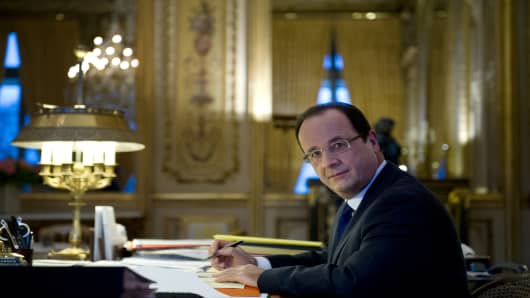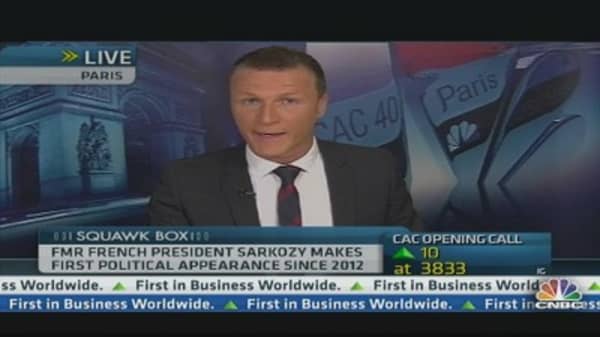One was a letter; the other was a tweet. Both will cause a blistering headache for the year-old presidency of François Hollande.
"The house is on fire. France is destroying 8,000 jobs a day," read the letter in Les Echos, signed by chief executives of firms such as Peugeot Citroën, EADS, and Sanofi. It attacked the policies of the Socialist president, which they said are stifling economic progress with high taxes and over regulation.
The tweet read: "This is not my political comeback. When I return to the podium it will be to speak to the French people about France." While Nicolas Sarkozy's first tweet since May last year denied any political movements, his decision to emerge into the public spotlight comes at an opportune moment, as Hollande's government comes under increasing pressure from the business community to change his ways.
(Read More: Moscovici to France's Businesses: Stop French-Bashing)
The letter from leading figures in the French business community follows a weekend which saw Pierre-Andrede Chalendar, the chief executive of Saint-Gobain (a leading manufacturing company), accuse Hollande of pursuing "zigzag" policies.
Those remarks prompted French finance minister, Pierre Moscovici, to call on the business community to be "conscious that we need to reform this country; that the government is at work to do so; and that we need some national unity in order to build a stronger France".
He then attacked the business community: "I'm against any kind of French-bashing," he said. "I really fight that. I also think that we need to respect each other."
(Read More: France's Hollande: The Euro Zone Crisis Is Over)
In the letter in Les Echos, the business leaders urged Hollande to focus on a rolling back of state spending before elections threaten his ability to push through major measures.
Hollande's socalist government presides over an economy which slipped back into recession in the first quarter of 2013. The president, who was elected last May, is treading a thin line between attempting to placate businesses keen on lower taxes and a public that is increasingly tired of budget cuts.
Since Hollande's election, unemployment in France has increased steadily to 10.8 percent in the first quarter of 2013, according to the French statistics agency INSEE, up from 10.2 percent in the second quarter of 2012.
(Read More: France Faces 'Devastating Scandal' as Economy Stalls)




